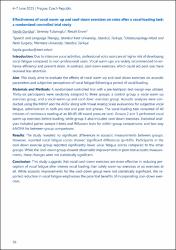Effectiveness of vocal warm-up and cool-down exercises on voice after a vocal loading task: a randomized controlled trial study
Citation
Güzdüz İ., Tulunoğlu S., Enver N. Effectiveness of vocal warm-up and cool-down exercises on voice after a vocal loading task: a randomized controlled trial study. 31st Congress of the Union of the European Phoniatricians, 2025.Abstract
Introduction: Due to intensive vocal activities, professional voice users are at higher risk of developing
vocal fatigue compared to non-professional users. Vocal warm-ups are widely recommended to en hance efficiency and prevent strain. In contrast, cool-down exercises, which could aid post-use, have
received less attention.
Aim: This study aims to evaluate the effects of vocal warm-up and cool-down exercises on acoustic
parameters and subjective perceptions of vocal fatigue following a period of vocal loading.
Materials and Methods: A randomized controlled trial with a pre-test/post-test design was utilized.
Thirty-six participants were randomly assigned to three groups: a control group, a vocal warm-up
exercises group, and a vocal warm-up and cool-down exercises group. Acoustic analyses were con ducted using the MDVP and the ADSV along with Visual Analog Scale evaluations for subjective vocal
fatigue, administered in both pre-test and post-test phases. The vocal loading task consisted of 40
minutes of continuous reading at an 80–85 dB sound pressure level. Groups 2 and 3 performed vocal
warm-up exercises before loading, while group 3 also included cool-down exercises. Statistical anal yses included paired sample t-tests and Wilcoxon tests for within-group comparisons, and two-way
ANOVA for between-group comparisons.
Results: The study revealed no significant differences in acoustic measurements between groups.
However, reported vocal fatigue scores showed significant differences (p<0.05). Participants in the
cool-down exercise group reported significantly lower vocal fatigue scores compared to the other
groups. While the cool-down group showed observable improvements in post-test acoustic measure ments, these changes were not statistically significant.
Conclusion: This study suggests that vocal cool-down exercises are more effective in reducing per ception of vocal fatigue after intense vocal loading than solely warm-up exercises or no exercises at
all. While acoustic improvements for the cool-down group were not statistically significant, the re ported reduction in vocal fatigue emphasizes the potential benefits of incorporating cool-down exer cise


















